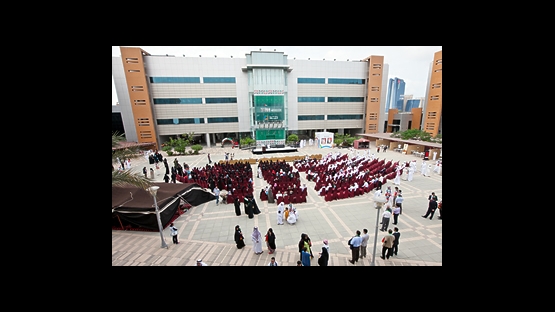After two successful sessions in Italy in as many years, the IAEA's School for Nuclear Energy Management is this year moving to the Gulf region. From 8-19 January, in Abu Dhabi, participants from the Gulf Cooperation Council (GCC) countries will study and learn essential knowledge of all applications of nuclear technology. Lectures, presentations and group work from IAEA and industry experts will help them be aware of the most recent developments in nuclear energy and develop a broad international perspective on the many issues related to the peaceful uses of nuclear technology.
The School, hosted by the Government of the United Arab Emirates and Khalifa University, is part of continuing efforts by the IAEA to address the knowledge management challenges in the nuclear industry of many countries.
"The generation of professionals who built and led the nuclear power industry for much of the past 50 years is approaching retirement and there are not enough students coming up through the educational system to take their place," IAEA Director General Yukiya Amano pointed out in his opening day message to the School's participants.
This situation is raising concerns among some countries about a possible shortage of skilled professionals in the nuclearfield in the coming decades, and the IAEA is doing all it can to help Member States address this issue. This School, being held in the United Arab Emirates, is part of Agency efforts to address thisproblem in the GCC area, Director General Amano said.
The School will provide a unique educational experience for young professionals in the Gulf region who have the potential to become future leaders in nuclear energy, whether in the nuclear industry itself, academia or the public sector.
In his opening statement on 8 January, IAEA Deputy Director General for Nuclear Energy, Alexander Bychkov, alluded to the growing support in the Gulf Region for nuclear power as a sustainable and clean energy source.
"A highly competent management is vital to the success at all stages of developing a safe and sustainable nuclear power programme," Mr. Bychkov said.
"Helping Member States - especially those considering or starting national nuclear power programmes - to obtain and manage this knowledge is an essential responsibility of the Agency," he added. "The School of Nuclear Energy Management plays an important role in meeting this responsibility."
During the course of the intensive two-week training, senior experts from the IAEA will be lecturing and presenting on a wide range of topics in the nuclear energy sector, including nuclear energy, nuclear safety, nuclear security and nuclear safeguards. The aim is to broaden the understanding of the current issues which need to be tackled by young professionals, and train them in new developments in technology and international perspectives on the safe use of nuclear energy.
"Many countries are concerned that they will not have enough skilled professionals in the nuclear field in the coming decades," Mr. Bychkov told the participants.
"However, when you return to your countries after the course, you will be better prepared to contribute to building and managing nuclear power programmes responsibly, safely and sustainably," he said.
Background
The School of Nuclear Energy Management in Abu Dhabi, United Arab Emirates, is the first of two schools scheduled for 2012; another one is set to take place in Tokyo, Japan in June. Other countries have also requested to host the School in the future.
About 40 participants from GCC countries - Kuwait, Oman, Qatar and the United Arab Emirates - are taking part in this training course. The programme of study, delivered by IAEA specialists and other international lecturers, covers the most important topics related to the nuclear energy sector.
They include topics such as: nuclear power; nuclear fuel cycle and waste management; lessons learned from Fukushima; energy planning; economics and finance; national nuclear infrastructure development from planning to decommissioning, reactor technologies and selections, nuclear security; emergency preparedness and response; nuclear law, international Conventions and relevant mechanisms; nuclear safety; non-proliferation; human resources and knowledge management, stakeholder involvement; and public communication.


